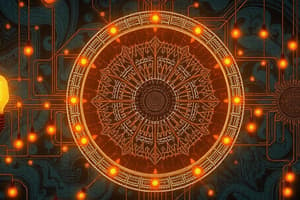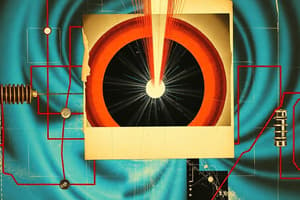Podcast
Questions and Answers
What does electrical engineering primarily deal with?
What does electrical engineering primarily deal with?
- Electricity, electronics, and electromagnetism (correct)
- Transportation systems
- Chemical engineering
- Biological systems
What does Ohm's Law mathematically represent?
What does Ohm's Law mathematically represent?
- V = IR (correct)
- V = R / I
- V = RI
- V = I / R
Which current flows in one direction?
Which current flows in one direction?
- RF
- AC
- Pulse
- DC (correct)
What is the formula for calculating power in electrical systems?
What is the formula for calculating power in electrical systems?
Which of the following disciplines focuses on automatically controlling electrical systems?
Which of the following disciplines focuses on automatically controlling electrical systems?
What crucial role does magnetism play in electrical engineering?
What crucial role does magnetism play in electrical engineering?
What does the field of telecommunications primarily focus on?
What does the field of telecommunications primarily focus on?
Which electrical engineering discipline blends electrical and computer science principles?
Which electrical engineering discipline blends electrical and computer science principles?
What is a primary application of renewable energy systems?
What is a primary application of renewable energy systems?
Which tool is primarily used for simulating electrical circuits?
Which tool is primarily used for simulating electrical circuits?
What is a key trend in electrical engineering for improving electrical grids?
What is a key trend in electrical engineering for improving electrical grids?
Which of the following best describes power electronics?
Which of the following best describes power electronics?
What safety consideration is crucial for electrical engineers?
What safety consideration is crucial for electrical engineers?
In which application are microcontrollers and embedded systems primarily used?
In which application are microcontrollers and embedded systems primarily used?
Which technology is crucial for data transmission in IoT applications?
Which technology is crucial for data transmission in IoT applications?
What is a significant use of measurement equipment in electrical engineering?
What is a significant use of measurement equipment in electrical engineering?
Flashcards
Electricity
Electricity
Flow of electric charge, characterized by voltage, current, and resistance.
Ohm's Law
Ohm's Law
States that current through a conductor is directly proportional to voltage across it.
Electrical Circuit
Electrical Circuit
Interconnected components forming a closed path for current flow.
AC
AC
Signup and view all the flashcards
Power (in electricity)
Power (in electricity)
Signup and view all the flashcards
Magnetism
Magnetism
Signup and view all the flashcards
Electromagnetism
Electromagnetism
Signup and view all the flashcards
Power Systems
Power Systems
Signup and view all the flashcards
Renewable Energy Systems
Renewable Energy Systems
Signup and view all the flashcards
Circuit Simulation Software
Circuit Simulation Software
Signup and view all the flashcards
Microcontrollers
Microcontrollers
Signup and view all the flashcards
Smart Grid Technologies
Smart Grid Technologies
Signup and view all the flashcards
Power Electronics
Power Electronics
Signup and view all the flashcards
Electrical Safety
Electrical Safety
Signup and view all the flashcards
Measurement Equipment
Measurement Equipment
Signup and view all the flashcards
High-Frequency Electronics
High-Frequency Electronics
Signup and view all the flashcards
Study Notes
Introduction to Electrical Engineering
- Electrical engineering is a branch of engineering that deals with the study and application of electricity, electronics, and electromagnetism.
- It encompasses a wide range of disciplines, including power systems, control systems, telecommunications, computer engineering, and signal processing.
- Engineers in this field design, develop, and test electrical equipment and systems for various applications.
Fundamental Concepts
- Electricity: The flow of electric charge. It is characterized by voltage (potential difference), current (flow rate), and resistance (opposition to flow).
- Ohm's Law: States that the current through a conductor between two points is directly proportional to the voltage across the two points. Mathematically represented as V = IR, where V is voltage, I is current, and R is resistance.
- Circuits: Interconnected components that form a closed path for current to flow. Basic circuit components include resistors, capacitors, inductors, and diodes.
- AC and DC: Alternating current (AC) periodically reverses direction, while direct current (DC) flows in one direction.
- Power: The rate at which work is done (or energy is transferred). Calculated as the product of voltage and current (P = VI).
- Magnetism: A fundamental force generated by moving electric charges. It plays a crucial role in generating magnetic fields, which can interact with other magnetic materials and electric currents.
- Electromagnetism: The interaction between electricity and magnetism. Maxwell's equations describe the fundamental laws governing electromagnetism.
Core Disciplines
- Power Systems: Deals with the generation, transmission, and distribution of electrical power. Includes topics like transformers, generators, and electric grids.
- Control Systems: Focuses on automatically controlling and regulating electrical systems to achieve specific objectives. Techniques for closed-loop feedback mechanisms are used.
- Telecommunications: Involves the transmission of information over long distances. Includes topics like signal processing, modulation, and communication systems.
- Electronics: Deals with the design and manufacturing of electronic devices, circuits, and systems. Includes transistors, integrated circuits, and semiconductor devices.
- Computer Engineering: Blends electrical and computer science principles. Focuses on computer hardware design, microprocessors, and digital logic.
Key Engineering Applications
- Renewable Energy Systems: Design and implementation of solar, wind, and hydroelectric power systems.
- Robotics: Development of automated robotic systems, often employing embedded electrical control systems.
- Automotive Engineering: Electrical systems in cars, including hybrid and electric vehicle technologies.
- Medical Devices: Designing and creating electrical equipment used for diagnosis and treatment. Includes medical imaging devices, pacemakers, and other implantable technologies.
- Consumer Electronics: Design of appliances and devices used in everyday life. Includes computers, smartphones, televisions, and various other household products.
Important Tools and Technologies
- Circuit Simulation Software: Programs that simulate electrical circuits, allowing engineers to analyze and predict circuit behavior without physical construction. Examples include LTSpice and PSpice.
- Measurement Equipment: Devices like oscilloscopes, multimeters, and signal generators used to measure and analyze electrical signals and parameters.
- Microcontrollers and Embedded Systems: Integrated circuits that combine central processing units (CPUs) with memory and input/output peripherals, used in applications that need specific control behaviors.
Emerging Trends
- Smart Grid Technologies: Using digital technologies to improve the efficiency, reliability, and security of electrical grids, enabling better monitoring, control, and integration of renewable energy sources.
- Power Electronics: Designing and developing power electronic converters (inverters, rectifiers, etc.) to convert energy efficiently between different forms, especially important in renewable energy applications and electric vehicles.
- Wireless Communication Technologies: Continued development and advancements in wireless communication technologies, and use for data transmission in various fields, especially in IoT (Internet of Things) applications.
- High-Frequency Electronics: Designing and utilizing high-frequency signals and devices for applications like telecommunications and wireless communication.
Safety Considerations
- Electrical engineers must adhere to safety regulations and standards to prevent electrical hazards.
Studying That Suits You
Use AI to generate personalized quizzes and flashcards to suit your learning preferences.




